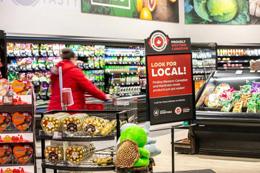Buy Canadian trend is growing, but will it last

Guest Commentary
By Sylvain Charlebois
While government action has its limits, Canadian consumers are taking matters into their own hands, one grocery trip at a time. Amid renewed trade tensions with the United States, including recent disputes over dairy, produce and packaged goods, there’s growing evidence that Canadians are deliberately favouring homegrown food products and steering clear of American brands. This isn’t just a passing trend—it’s turning into a grassroots boycott.
Food boycotts are often unpredictable. Some fade quickly; others cause meaningful disruption. What’s unfolding now is rare: a swift, broad-based rejection of American food imports. Loblaw and Metro, two of Canada’s largest grocery chains, have both acknowledged the shift. In recent weeks, they’ve noted that Canadian-made products are outselling imports. Although hard data is limited, grocers are already reworking sourcing strategies, even in winter-dependent categories. The speed and scale of this consumer-led realignment caught much of the industry off guard.
Contrast that with the Reddit-fuelled Loblaw boycott, which began as a protest against alleged price gouging and rising grocery bills. Despite high-profile calls for a consumer revolt, Loblaw’s financials tell a different story. Year-over-year revenues are up nearly three per cent, profits have grown, and shares have climbed more than 25 per cent since the boycott began on May 1. All indicators are outpacing the broader sector. The online protest may be loud, but most consumers are still shopping.
Why did one boycott stall while the other gained traction? Credibility. The Loblaw campaign relied on claims of profiteering, but without clear evidence. Gross margins remained stable, and in many periods, food sales growth lagged behind inflation. A spike in margins would have indicated price gouging; its absence suggests otherwise. Complicating matters, grocers generate substantial revenue from non-food items—a nuance often overlooked in online debate.
The anti-American movement, by contrast, taps into something more visceral. Years of hostile rhetoric from U.S. President Donald Trump have left a mark. This is Canada’s own “Wall moment,” echoing the backlash seen in Mexico in 2016, when Trump insisted they pay for his proposed border wall, sparking consumer boycotts of U.S. goods. In Canada, that reaction is playing out in grocery aisles.
But food patriotism is fleeting. With the federal election now behind us and political tensions likely to ease, the emotional fuel behind the boycott will diminish. If Canadian products lose their price edge, economic pragmatism will quickly return. The wallet, ultimately, trumps emotion.
The challenge now is to turn that emotional reaction into a strategic advantage—for consumers, producers and the economy alike. Canadian food processors and retailers can’t rely on anti-Americanism to sustain growth. They must compete on quality, price and trust. This is an opportunity to build lasting loyalty, not through resentment, but through performance.
One way to help? Tear down interprovincial trade barriers, such as restrictions on transporting dairy, wine or packaged foods between provinces. Allowing Canadian firms to compete more openly across provincial lines would reduce costs, expand selection and make domestic products more attractive. With the right reforms, a short-term patriotic push could become a long-term preference for Canadian-made food.
Canada has some of the most trusted food producers in the world. But lasting success will come from strategy and value, not politics. The emotional backlash may fade, but the case for buying Canadian can endure—if we make it for the right reasons.
Dr. Sylvain Charlebois is a Canadian professor and researcher in food distribution and policy. He is senior director of the Agri-Food Analytics Lab at Dalhousie University and co-host of The Food Professor Podcast.






